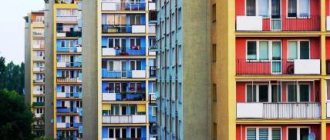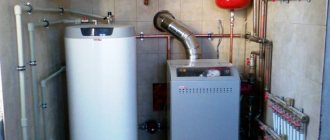Due to the climatic conditions of the region, heating apartments and houses in cold weather is a prerequisite for comfortable and safe living in them.
The beginning and end of the heating season are tied to a specific date, but adjustments can be made to the timing if the cold snap begins earlier than usual . Therefore, the heating season may have a different start date; this is decided by local authorities, city utility companies, and sanitary services.
For those apartment owners who use a centralized mains, it is important to know when heat will begin to be supplied. After all, violation of the regime is a reason to file a complaint with the responsible authority .
ATTENTION! The standard heating period is typical for houses with a centralized heat supply system. Homeowners with an individual boiler can independently turn the heating on or off.
Determination of the heating season
Traditionally, heat is provided to the apartment in the fall, somewhere in the middle of this time of year. This is when the air temperature begins to decrease. Inside the apartments, the air is cooled to the permissible limit. The duration of the heating period is about six months, its completion depends on the establishment of a comfortable outside temperature .
IMPORTANT! The appearance of the concept of a heating season in the public utilities sector became possible after the development of a centralized supply of thermal energy to apartment buildings.
Answer
Disconnection can be made due to arrears in payment for services provided, due to identified facts of non-contractual consumption, due to accidents, etc. (Clause 76 of the Decree of the Government of the Russian Federation dated 08.08.2012 No. 808). Disabling for other reasons is unacceptable.
The rationale for this position is given below in the materials of the “Lawyer System”
.
DECREE OF THE GOVERNMENT OF THE RF OF 08.08.2012 No. 808 “On the organization of heat supply in the Russian Federation and on amendments to certain acts of the Government of the Russian Federation”
"76. Restrictions and cessation of heat supply to consumers may be introduced in the following cases:
non-fulfillment or improper fulfillment by the consumer of obligations to pay for thermal energy (power) and (or) coolant, including obligations for their advance payment, if such a condition is provided for in the contract, as well as violation of the terms of the contract on the quantity, quality and values of the thermodynamic parameters of the returned coolant and (or) violation of the thermal energy consumption regime, significantly affecting the heat supply to other consumers in a given heat supply system, as well as in case of non-compliance with the mandatory requirements for the safe operation of heat-consuming installations established by technical regulations;
termination of the obligations of the parties under the heat supply agreement;
identification of facts of non-contractual consumption of thermal energy (power) and (or) coolant;
occurrence (threat of occurrence) of emergency situations in the heat supply system;
availability of a consumer request to introduce a restriction;
other cases provided for by regulatory legal acts of the Russian Federation or the heat supply agreement*.”
In recent years, there has been a steady trend among homeowners in apartment buildings to switch to autonomous heating options. The increased financial capabilities of apartment owners today make it possible to provide heating in the apartment at a completely different, higher technical level. This is greatly facilitated by the emergence of autonomous devices and units that are highly efficient and cost-effective.
The desire to make your apartment absolutely independent of centralized heating is quite understandable and understandable. Often the quality of the heating system in winter leaves much to be desired. Barely warm radiators when winter is raging outside, unreasonable financial expenses are real prerequisites for completely abandoning heating in the apartment.
What law regulates the process of heating residential premises?
The dates that define the heating season - October 15 and April 15 - are arbitrary. Utilities are roughly guided by them when preparing equipment and networks for long-term operation during the cold period. But in reality, the start and finish of heating houses is set differently every year, depending on the weather and the average temperature outside.
On May 26, 2006, Decree of the Government of the Russian Federation No. 304 was issued, according to which, to start heating, the temperature must be fixed at no higher than 8 degrees for 5 days . To calculate the average temperature, the highest and lowest air readings for the day are summed up.
ATTENTION! Sometimes residents of houses complain that even after 5 days of cold (below 8 degrees), the radiators in the house are cold. But heat does not enter the apartments immediately after the boiler room is started; it may take more than one day to heat all objects evenly.
Can the batteries be turned on again if it gets colder?
All centralized heating systems in all settlements of the Russian Federation operate on the same principle. After lengthy preparation, which takes place in the off-season, they are turned on. At the end of the season, on the date specified by the municipality, they are switched off. Reactivation immediately after deactivation is not possible.
In some cases, thermal power plants and boiler houses can be switched in periodic heating mode. This mode involves changing the temperature in heating systems at different times of the day. For example, at night the power increases, during the day it decreases.
Central heating is turned off based on the decision of the municipality.
Residents of apartment buildings connected to it cannot influence the temperature in the radiators of their apartments. In most regions of the country, heating is turned off between April 20 and May 10. Useful article? Rate and share with friends!
Principles of district heating
The pipeline through which heat is supplied to the house consists of pipes extending from the central city boiler house. Typically, the coolant in the pipeline is hot water. also be used for heating steam, electricity .
In apartments, pipes are installed at the hot water inlet and outlet. Thanks to a properly designed heating system, thermal energy is evenly distributed throughout the pipes and radiators. Centralized heating of apartments is used in settlements with different population sizes.
This type of heating is convenient, practical, and economical. But its duration does not always correspond to weather conditions. Therefore, it is important for apartment residents to know the norms for turning on the heating depending on the outside temperature.
Approximate schedule for turning off heating in Russian cities in 2022
Approximate dates for the end of the heating season in large cities of the Russian Federation are presented in the table.
| City | Heating shutdown schedule |
| Moscow | May 7 |
| Saint Petersburg | 26 of May |
| Novosibirsk | 26 April |
| Ekaterinburg | May 7 |
| Kazan | April 27 |
| Nizhny Novgorod | May 7 |
| Chelyabinsk | April 30 |
| Samara | April 28 |
| Omsk | April 21 |
| Rostov-on-Don | April 24 |
| Ufa | May 3 |
| Krasnoyarsk | May 10 |
| Voronezh | April 30 |
| Permian | May 4th |
| Volgograd | April 29 |
The dates indicated in the table are estimates. Information is based on statistics for 2022. The exact shutdown dates for heating systems may differ from the dates indicated. Moreover, they may be different for different settlements of the same region.
What determines the start of heat supply?
At what room temperature the heating is turned on is a question that interests consumers every fall, because there is no desire to freeze in the house due to the fact that the autumn bad weather began earlier than expected. If a low average temperature remains in a residential area for a long time, this affects the health of the residents, the condition of the furnishings and the house itself .
ATTENTION! No matter what date the heating season starts, it is important that utility companies are fully prepared for it. It is necessary to check the integrity of the pipeline, the reliability of the boiler room equipment, and the readiness of the heating system inside the house to supply hot water.
- For some time, standards determined the start of heating in October throughout the country. But over such a large area, the climatic conditions in cities and villages are different and depend on the climate zone. And so the order of the start of the season was changed, as was its duration.
- Which months are included in the heating period? This also depends on the region. In hot areas, heating is needed only for a few months; the cold part of the country needs to heat houses almost the entire year (ten months).
By law, heat energy suppliers must turn on heating systems for residential buildings if the outside temperature is no higher than 8 degrees Celsius for more than 5 days.
But the rules and procedures for the heating season also take into account other important factors. Even if it is cold outside in early autumn or late spring, but weather forecasters predict rapid warming, the batteries may remain cold . During the inter-heating period, it is very rare to start the heating system; this is associated with high costs.
The official decree on the beginning of the centralized heating season for apartments and houses is a guide to action for municipal utilities in the locality. Before the release of such a resolution, experts calculate the most favorable beginning of the period; for this, they record data on the average daily outside air temperature several times a day, and study information from meteorologists and weather forecasters.
Read also: The most comfortable air temperature for humans.
ATTENTION! The heating period must begin before frost, since at an average temperature below zero, which persists for some time, the non-working equipment of the heating pipeline and boiler room fails. Expensive repairs will entail large expenses.
For the same reason, suppliers do not turn off the heat until the desired temperature outside has been established.
Legal subtleties and nuances when disconnecting a central heating center
There is an option to turn off the central heating without having to apply for a permit. Many of us have rarely seen contracts with utility companies for the supply of heat to your home. A priori, it is assumed that the owners of an apartment building agree with the terms of supply of centralized heating services. In fact, the situation is up in the air from a legal point of view. No contract, no obligations.
Moreover, in almost every house you can find residents who have voluntarily disconnected from the heating supply and managed to equip their apartments with autonomous heating systems. There are practically no cases of prosecution for arbitrariness in this situation, so everyone decides the situation at their own peril and risk.
Let's consider situations where, in order to make your desire to refuse centralized heating services a reality, the consent of the residents of your house and neighbors is not required.
Apartment buildings often have incomplete technical documentation regarding the heating system. In this regard, it often happens that the elements of the heating system are not part of the property complex of the buildings. Despite the fact that in such a situation you will not need to obtain collective consent to re-equip the heating systems in the apartment, official permissions from regulatory and service organizations are necessary.
The reason is that any intervention in engineering networks requires mandatory recording in technical documentation. For each house there is a technical passport, which takes into account all the data on the operating heating system. Removal of radiators, insertion and installation of plugs in apartments, any other changes must be reflected in the technical passport. Guided by Art. 26 of the Housing Code of the Russian Federation for further actions you will need the following package of documents:
- application in free form;
- registration certificate for the apartment to be switched off;
- documents confirming the right of ownership (use) of the apartment;
- written consent of all legal occupants of the apartment;
- technical conclusion of specialists on the possibility of disconnecting and subsequent re-equipment of communications.
To complete the picture, it is necessary to attach to the package of documents a reconstruction project, which is developed by specialists from the relevant organizations and authorities. The design documentation must include calculations that prove the functionality of the central heating system in the house in the absence of elements of the disconnected apartment. In addition to the project, it is better to have a scheme for thermal-hydraulic calculations of the facility and an accurate calculation of residual heating.
A technically competent project is the first step towards obtaining permission. However, if the changes made may negatively affect the thermal efficiency of the entire house and cause a violation of the temperature regime in the apartments of other homeowners, such a project will be rejected.
Features of the end of the central heating season
- How long the heating period lasts and when it ends - it is important to know this information in order to demand high-quality utility services from heat suppliers. The months when you have to pay for heat are the most difficult in terms of financial costs for the population.
- It is impossible to say in advance in which month the heating will be turned off this year; it depends on weather conditions, the duration of low temperatures, and the climate zone in which the settlement is located. Therefore, modern law does not establish an exact date when the period of heating residential premises by a centralized system ends.
- Like the beginning of the heat supply, its end is related to the outside temperature. An important indicator for shutting off the coolant supply is maintaining a certain outside temperature for 5 days.
- Suppliers must strictly comply with this and other conditions for the end of the heating period.
If frost and low temperatures persist for a long time in the spring, the heating season will be delayed , although this will lead to high utility bills.
And yet, without a comfortable temperature in the house, it is impossible to live in it, relax, or maintain good health.
Step-by-step instructions for filing a complaint about late heating switching on
A complaint about the lack of heating can only be filed after official confirmation of the start date of the heating season. The application is drawn up in the name of the head of the organization with which the contract for heat supply services was concluded.
The form of the document is free, but it is necessary to indicate the following information:
- Full name and contact details of the applicant;
- description of the problem and a list of measures that were taken to solve it;
- list of requirements;
- date of application and signature of the apartment owner.
The complaint is drawn up in two copies. The first is transferred to the authorized person, and the second remains with the owner.
Important! The owner's copy must be marked with the date the claim was received. If any documents appeared during the settlement of the issue, certified copies of them must be attached to the complaint.
Is it possible to turn off during the heating season?
Suppliers must carefully prepare for each heating season, checking the condition of pipelines, boiler room equipment, and upgrading networks.
Nevertheless, even with a high quality of preparation , cases are not excluded when utility companies turn off the heating in houses or apartments . This is usually associated with emergency situations on pipeline lines or in the boiler room itself.
Also, heating of the house may be stopped temporarily due to damage to the pipeline in the premises of the residential building.
ATTENTION! According to the law, a shutdown during the heating period is impossible, but if it occurs, the time without heat supply should be minimal. Otherwise, the supplier will face fines and sanctions due to an irresponsible attitude to its responsibilities.
- If the room temperature is only 8 degrees Celsius, heating can only be stopped for 2 hours. At a temperature of 10 degrees - no more than 8 hours.
- It is only permissible to turn off the heat for 16 hours when the room temperature is 12 degrees.
- Even due to accidents during the heating period, the permissible number of hours without the supply of thermal energy is 24.
If utilities do not comply with these important rules established by law, consumers have the right to demand a recalculation of heating payments. Payment will be reduced by 0.5% for each hour of exceeding permissible standards.
How does this happen
Due to the nature of the central heating system, it is turned off simultaneously for objects of the same type. That is, it is impossible for the heating to be turned off in two houses belonging to the same combined heat and power plant on different days.
However, CHP workers do not turn off the heating at the same time. A sequential algorithm is used:
- Industrial facilities (factories, warehouses, etc.) and public buildings (shops, shopping centers, etc.) are the first to be turned off.
- Then residential buildings are switched off.
- The last thing to do is turn off the heating system in social institutions (hospitals, clinics, universities, schools, kindergartens, etc.).
Possible causes of heating problems
There are reasons beyond a person’s control, the so-called force majeure.
Such circumstances include:
- Natural disasters causing serious damage to waterways.
- A major car accident on the road caused damage to the pavement and the pipes running underneath it.
But much more often, heating interruptions are associated with negligent attitude towards the work of utility employees, such as:
- an initially incorrect design of heating networks;
- poorly installed insulation of water pipes - for this reason, the lines freeze;
- the system was installed with technical violations;
- lack of level or pressure of liquid in coolants;
- blockages in the central water supply that were not cleared in a timely manner;
- air pockets have not been removed from the system;
- breakdowns in the main resource management units;
- poor quality maintenance of heating networks inside a residential building or premises.
Alternative heating options. The reality and consequences of this step
The main argument that guides the owner of an apartment who wants to disconnect from the heating plant and install autonomous heating in his home is independence. A characteristic feature of our country is the rapid change of seasons. Summer ends quickly; the heat accumulated in houses during the warm period quickly evaporates. For many of us, waiting for the heating season to officially begin is associated with discomfort. There is still quite a lot of time before the date for turning on the centralized heating, but the apartment is already cold and not comfortable. There is a way out, and it just suggests itself.
Your own autonomous boiler can solve such problems once and for all. But how can you turn off the central heating in your apartment so that you can independently decide when, how much and what to pay for? All these issues require careful analysis and a competent approach. The main problem is a huge bureaucratic work. To once and for all refuse the services of a regional energy company, you will need a lot of permits and related documentation.
Any unauthorized intervention in the system can lead to disruption of the entire complex as a whole. Switching off one apartment from a single heating system will require re-equipment of the entire network and is associated with a large amount of engineering and technical work.
The entire system, in accordance with legal norms, is part of a single property complex, which belongs to an apartment building. The composition of the property of a residential building, its functionality and performance are determined by the homeowners. The conclusion is that decisions to make changes to the centralized heating system are made collectively. This requirement is clearly stated in the Housing Code. Disabling one apartment is an individual decision. However, unauthorized shutdown without obtaining the appropriate permits and approvals is punishable by law. In some cases, such actions on the part of the apartment owner may be classified as a criminal offense. Any work related to utility networks in an apartment building must be carried out by specialists, guided by the appropriate permits, technical specifications and design.
When to turn on the heating after winter
The question of turning on batteries worries citizens just as much as the question of turning them off.
To find out the approximate timing, you need to find out what conditions the heating companies will be guided by:
- For 5 days, the average temperature outside the window should be no more than 8°C. This mark was not chosen by chance. If you shift the deadlines, there will be a possibility of the heating system freezing, especially in the entrances of residential buildings. If such a situation arises, the structure will be in an emergency situation, and repairs will be expensive.
- The heating system is turned on from October 1 to October 15. It is not advisable to launch heat supply earlier, since the process is labor-intensive and expensive.
- Experts also take into account the weather forecast for the coming month. If a sharp warming is observed after a few days, then there is no point in turning on batteries in houses. The consumer will have to pay money for wasted heat supply.
Starting up a heating system always involves a lot of trouble. Heating mains quickly gain the necessary power, but heating does not appear in radiators immediately.
Note: there is air in the system that blocks the flow of heat. To solve the problem with low temperature in the apartment, the owner must vent it himself. To do this, you need to open two valves located on the radiators.
Technical difficulties
If all documentation meets the requirements, the apartment refurbishment project has been agreed upon, the type of autonomous heating source satisfies fire safety standards and operating conditions in an apartment building, you can expect to receive a permit. Another thing is that such actions on the part of public utilities are not met with enthusiasm and the bureaucratic procedure can drag on for months.
Regarding the technical side of the matter, the task of disconnecting the apartment from centralized heating does not seem difficult. To solve it, you just need to invite qualified workers. Dismantling of existing equipment and subsequent installation of an autonomous heating system is carried out in strict accordance with the project, with the participation of specialists.
Otherwise, you may encounter a number of problems, first technical, and then administrative.
ATTENTION: IN CONNECTION WITH THE ARISING RESPONSIBILITY TO CONTRIBUTE TO THE OVERHAUL REPAIR FUND OF THE TVERSKY REGION FROM JULY 01, 2014, PLEASE READ THE SELECTED INFORMATION
Normal temperature in the apartment
- The normal temperature in residential premises is at least +18 degrees; in corner rooms it should not fall below +20 degrees;
- It is advisable that the temperature in the bedrooms should not exceed 17-18 degrees. This mode will ensure healthy and comfortable sleep;
- A temperature of 18-19 degrees is suitable for kitchen premises, since a large number of electrical and heating appliances are located here. At higher temperatures, it will become very hot and stuffy while cooking. In addition, more dirt, grime and grease will remain on the walls, furniture and ceiling. How to wash off grease in the kitchen, see;
- The temperature in the bathroom must be maintained at 24-26 degrees, since this room is characterized by high humidity. At lower temperatures, you will feel damp and cold, and mold and mildew may appear;
- Pay special attention to the temperature regime if a small child lives in the apartment. For newborn children, a comfortable temperature is considered to be 22-24 degrees, for older babies it is 20-22 degrees;
- In rooms other than the bathroom, do not exceed the temperature above 22 degrees, otherwise the rooms will be stuffy and uncomfortable.
conclusions
Based on the information provided, we can conclude the following. The authority to make decisions on the start of the heating season is vested in local authorities. The exception is federal cities. values (St. Petersburg, Sevastopol, Moscow). In them, relevant decisions can be adopted by government bodies.
The heating period should begin after five days, during which the average daily temperature was at +8. Simply put, heat is supplied on the sixth day. At the same time, the law does not prohibit starting the heating period earlier than the specified time. But, in any case, there must be a decision by local authorities.
Where to call if the heating is turned off - hotline for complaints
You should initially call about heating to the office of the management company and the district emergency service. Sometimes the service organization has no information that the heating supply to the house has been suspended. In other situations, management company employees do not respond to complaints.
In this case, you need to call special hotlines about heating.
The following services operate in Moscow and Moscow Region to regulate the situation with heat supply:
Table 1.
| Contacts | Organization |
| +74955395353 | 24-hour telephone service regarding housing issues. Unified dispatch center for utilities. |
| +74955395959 | United Energy Company |
| +74956809861 | Housing and communal services |
| +74956817367 | Moscow Department of Housing and Communal Services. Directly supervises issues of water resources, sewerage and heating. |
| +74956810549 | The second number of the control room of the Ministry of Housing and Communal Services. You should also call here if the heating is turned off. |
| +74956202760 | Emergency service for road accidents and repair of pipelines located under the road surface. |
| +74957758770 | City center of the capital. |
| +74997633434 | Vodokanal stronghold |
| +74956578703 | An organization that controls the operation of drains. |
A complaint can be submitted remotely through the websites of local municipalities:
Table 2.
| Department | Link to the official portal |
| Moscow administration | |
| Electronic reception of the mayor | |
| MOEK | |
| Public services | |
| "Moscow is our city" | |
| GZHI | |
| Ministry of Housing and Communal Services for Moscow Region | |
| Government of Moscow region |
If the problem is not resolved
If the HOA, housing office or management company have not taken any measures, or the problem has not been resolved within two weeks after drawing up the report, you need to file a complaint with the State Housing Inspectorate, Rospotrebnadzor or directly with the Prosecutor's Office. Or you can send an application to three authorities at once. To speed up the result, it is better to draw up a collective complaint from residents.
In the application, carefully describe the problem, attach a copy of the request to the service organization, a copy of the report and a copy of the service’s response. In addition, you can take additional temperature measurements and check the living conditions in the apartment with the help of an independent expert.
Among the problems existing in the housing and communal services sector, citizens are particularly concerned about the issue regarding the duration of the heating season. Many people do not know when it starts and ends, and who is responsible for supplying heat. Later in the article we will deal with these issues.
Authorized body
The Rules do not indicate who is responsible for the heating period. Everything is more or less clear with the outside temperature. It is unclear which body should be considered authorized. Let us turn to the provisions of Federal Law No. 131.
In paragraph 4 of paragraph 1 of part 16 of article of the specified regulatory document, the number of issues within the jurisdiction of municipal authorities includes the organization of gas, water, heat supply, drainage and sewerage within the municipality. Based on Article 7 of the same law, legal acts on problems of local importance are adopted directly by the population or structures of territorial self-government (their officials).
Consequently, the organization of heat supply is included in the list of issues on which decisions are made by local authorities. This conclusion is specified in the Rules and Standards for the Operation of Housing Stock. Clause 2.6.9 establishes that it begins within the period specified in the legal acts of territorial self-government structures. In the absence of such a decision, neither the HOA, nor the management company, nor other organizations can begin supplying heat to houses, even if within 5 days. The average daily temperature is below +8.











